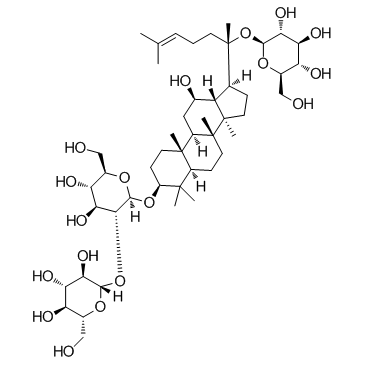Ginsennoside rd attenuates cognitive dysfunction in a rat model of Alzheimer's disease.
Juanfang Liu, Xiaodong Yan, Ling Li, Yi Zhu, Kefeng Qin, Linfu Zhou, Dong Sun, Xiaohui Zhang, Ruidong Ye, Gang Zhao
Index: Neurochem. Res. 37(12) , 2738-47, (2012)
Full Text: HTML
Abstract
Alzheimer's disease is a neurodegenerative disease characterized by the production of β-amyloid proteins and hyperphosphorylation of tau protein. Inflammation and apoptotic severity were highly correlated with earlier age at onset of Alzheimer's disease and were also associated with cognitive decline. This study aims to examine whether the traditional Chinese medicine ginsennoside Rd could prevent cognitive deficit and take neuroprotective effects in β-amyloid peptide 1-40-induced rat model of Alzheimer's disease. To produce Alzheimer's disease animal model, aggregated β-amyloid peptide 1-40 injected into hippocampus bilaterally. Ginsennoside Rd protected their cognitive impairment and improved their memory function by daily intraperitoneal injection for 30 days consecutively. In addition, ginsennoside Rd alleviated the inflammation induced by β-amyloid peptide 1-40. Furthermore, ginsennoside Rd played a role in the down-regulation of caspase-3 proteins and reduced the apoptosis that normally followed β-amyloid peptide 1-40 injection. The results of this study showed that the pretreatment of ginsennoside Rd had neuroprotective effects in β-amyloid peptide 1-40-induced AD model rat.
Related Compounds
| Structure | Name/CAS No. | Molecular Formula | Articles |
|---|---|---|---|
 |
ginsenoside Rd
CAS:52705-93-8 |
C48H82O18 |
|
Transcriptome analysis of Panax vietnamensis var. fuscidicus...
2015-01-01 [BMC Genomics 16 , 159, (2015)] |
|
Protective effects of ginsenoside Rd on PC12 cells against h...
2008-10-01 [Biol. Pharm. Bull. 31(10) , 1923-7, (2008)] |
|
Bioconversion of ginsenoside Rc into Rd by a novel α-L-arabi...
2013-04-01 [Antonie van Leeuwenhoek 103(4) , 747-54, (2013)] |
|
Ginsenoside Rd attenuates early oxidative damage and sequent...
2011-02-01 [Neurochem. Int. 58(3) , 391-8, (2011)] |
|
Highly selective microbial transformation of major ginsenosi...
2012-10-01 [J. Appl. Microbiol. 113(4) , 807-14, (2012)] |